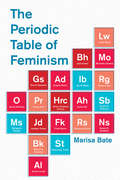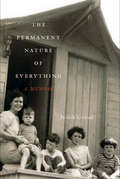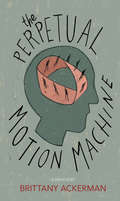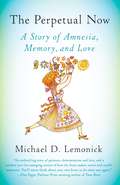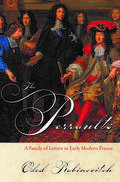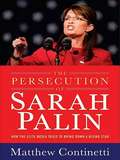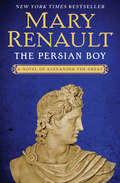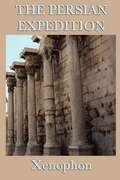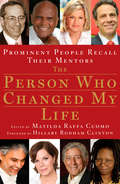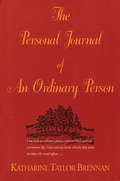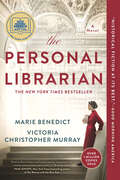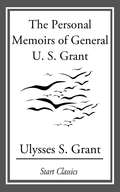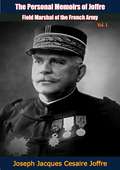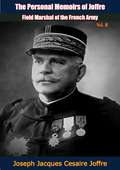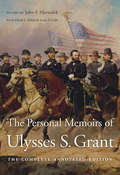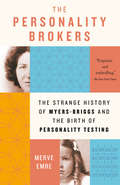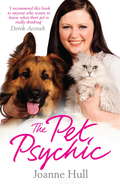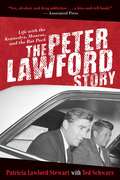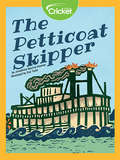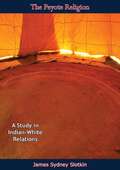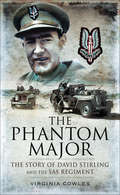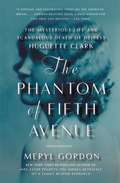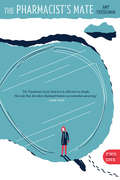- Table View
- List View
The Periodic Table of Feminism
by Marisa BateA cleverly nerdy review of feminist history told through the wide range of women who have shaped it, from Ruth Bader Ginsberg and Oprah to Beyoncé and The Spice GirlsA quirky, intelligent, and stylish review of the feminist movement, told through the stories of standout figures who have shaped it, The Periodic Table of Feminism charts the impact of female leaders from Betty Friedan and Ruth Bader Ginsburg to Michelle Obama and Oprah. Using the periodic table as a categorical device, the featured women are divided into "chemical" groups to show how the women and the battles they fought speak to each other across time and geography: Precious Metals: the face of the movements, like Simone De Beauvoir and Gloria SteinemCatalysts: Pioneers and fire-starters, like Susan B. Anthony and Sheryl SandbergConductors: The organizers, like Sojourner Truth and Rebecca SolnitDiatomics: Women working together, like The Spice Girls and The Women's Equality PartyStabilizers: Pacifists, like Margaret Atwood, Lindy West, and Eve EnslerExplosives: Radicals, anarchists, and violent uprisers, like Adrienne Rich and Roxane GayRejectors: "I am not a feminist" proclaimers, like Alice Walker and Sarah Jessica ParkerWith clever "top 10" lists--such as Feminists in Fiction, Feminists Before Feminism, Best Women's Marches, and Male Feminists--plus 120 meme-ready illustrations and inspiring pull quotes, this essential guide to feminism offers courage and inspiration for a new generation.
The Permanent Nature of Everything
by Judith CowanAt five and six years old, lying in the long grass and wildflowers near her family's house on the outskirts of 1940s Toronto, Judith Cowan was certain that what she experienced was the permanent nature of everything. Little by little, she comes to recognize threats: a leering neighbour asking strange questions about her gender, a lady who has died of an illness not revealed, the smell of something dead in the ditch. Her disapproving, resourceful, and frustrated mother, born to Methodist missionaries in China, tells frightening tales: how a pig will kill and eat a little girl, or how she herself as a small child was shot at by pirates on the Yangtze. Sharing memories from the nineteenth century, her grandparents recount their youthful follies, and she realizes that all of us are swept along in time's passing stream. But books seem permanent, and give access to a world of pleasure even if, because of her red hair, the boys torment her on the road to school, and she has to fight. A meticulous memoir of growing up in a Canada scarcely aware of itself as a country, The Permanent Nature of Everything rescues recollections from a vanished time and traces the emerging awareness in the emotional world of a child.
The Permanent Nature of Everything: A Memoir
by Judith CowanAt five and six years old, lying in the long grass and wildflowers near her family's house on the outskirts of 1940s Toronto, Judith Cowan was certain that what she experienced was the permanent nature of everything. Little by little, she comes to recognize threats: a leering neighbour asking strange questions about her gender, a lady who has died of an illness not revealed, the smell of something dead in the ditch. Her disapproving, resourceful, and frustrated mother, born to Methodist missionaries in China, tells frightening tales: how a pig will kill and eat a little girl, or how she herself as a small child was shot at by pirates on the Yangtze. Sharing memories from the nineteenth century, her grandparents recount their youthful follies, and she realizes that all of us are swept along in time's passing stream. But books seem permanent, and give access to a world of pleasure even if, because of her red hair, the boys torment her on the road to school, and she has to fight. A meticulous memoir of growing up in a Canada scarcely aware of itself as a country, The Permanent Nature of Everything rescues recollections from a vanished time and traces the emerging awareness in the emotional world of a child.
The Perpetual Motion Machine: A Memoir
by Brittany AckermanA memoir exploring a young woman&’s troubled childhood, her bond with her older brother, and the toll of drugs and alcohol on their lives. Inspired by a brother&’s high school science project—a perpetual motion machine that could save the world—The Perpetual Motion Machine is a memoir in essays that attempts to save a sibling by depicting the visceral pain that accompanies longing for some past impossibility. The collection has been a science project in its study of memory, in the calculation and plotting of the moments that make up a childhood. The preparation has been &“in the field&” in that it is built upon the gathering of lived experience; the evidence is photo albums, family interviews, and anecdotes from friends. The project has been one giant experiment—to see if they can all make it out alive.&“Full of hard-won wisdom, beautifully written and deeply moving . . . an exquisite chronicle of family and trauma and hope and longing, and announces Brittany Ackerman as an exciting new voice in letters.&” —Alan Heathcock, author of VOLT and 40 &“[An] instantly engaging and wildly engrossing memoir. . . . Her prose is accessible and affecting, and her family story is exquisite in its luminous detail and intimacy, full of heartbreak and humor.&” ―Davy Rothbart, author of My Heart is an Idiot, creator of FOUND Magazine, and contributor to This American Life&“Told in simple, spare language, Ackerman&’s story is powerful not only for the story it tells, but also for the eloquent silences and chronological ruptures that symbolize the painfully fractured nature of her life and that of her brother. A brief but poignant memoir.&” —Kirkus Reviews
The Perpetual Now: A Story of Amnesia, Memory, and Love
by Michael D. LemonickIn the aftermath of a shattering illness, Lonni Sue Johnson lives in a "perpetual now," where she has almost no memories of the past and a nearly complete inability to form new ones. The Perpetual Now is the moving story of this exceptional woman, and the groundbreaking revelations about memory, learning, and consciousness her unique case has uncovered. Lonni Sue Johnson was a renowned artist who regularly produced covers for The New Yorker, a gifted musician, a skilled amateur pilot, and a joyful presence to all who knew her. But in late 2007, she contracted encephalitis. The disease burned through her hippocampus like wildfire, leaving her severely amnesic, living in a present that rarely progresses beyond ten to fifteen minutes. Remarkably, she still retains much of the intellect and artistic skills from her previous life, but it's not at all clear how closely her consciousness resembles yours or mine. As such, Lonni Sue's story has become part of a much larger scientific narrative—one that is currently challenging traditional wisdom about how human memory and awareness are stored in the brain. In this probing, compassionate, and illuminating book, award-winning science journalist Michael D. Lemonick uses the unique drama of Lonni Sue Johnson's day-to-day life to give us a nuanced and intimate understanding of the science that lies at the very heart of human nature.
The Perraults: A Family of Letters in Early Modern France
by Oded RabinovitchIn The Perraults, Oded Rabinovitch takes the fascinating eponymous literary and scientific family as an entry point into the complex and rapidly changing world of early modern France. Today, the Perraults are best remembered for their canonical fairy tales, such as "Cinderella" and "Puss in Boots," most often attributed to Charles Perrault, one of the brothers. While the writing of fairy tales may seem a frivolous enterprise, it was, in fact, linked to the cultural revolution of the seventeenth century, which paved the way for the scientific revolution, the rise of "national literatures," and the early Enlightenment. Rabinovitch argues that kinship networks played a crucial, yet unexamined, role in shaping the cultural and intellectual ferment of the day, which in turn shaped kinship and the social history of the family.Through skillful reconstruction of the Perraults’ careers and networks, Rabinovitch portrays the world of letters as a means of social mobility. He complicates our understanding of prominent institutions, such as the Academy of Sciences, Versailles, and the salons, as well as the very notions of authorship and court capitalism. The Perraults shows us that institutions were not simply rigid entities, embodying or defining intellectual or literary styles such as Cartesianism, empiricism, or the purity of the French language. Rather, they emerge as nodes that connect actors, intellectual projects, family strategies, and practices of writing.
The Persecution of Sarah Palin
by Matthew ContinettiThe real story of the Republican vice presidential nominee and her collision with the elite liberal media As the second woman ever nominated as a candidate for vice president, Alaska governor Sarah Palin became an instant phenomenon. Americans were enthralled by a woman with charm, ambition, natural political talent and a passion for conservative values. But the fascination of ordinary people quickly drew an unprecedented attack from the media elite and liberal activists. Far beyond the normal bounds of tough questions and challenges, Palin's enemies decided that nothing was too personal to attack-including her marriage, her children, her faith, and her wardrobe. The media distorted Palin's positions and beliefs beyond recognition. Consequently, almost every word out of her mouth was spun as a "flub. " Weekly Standard writer Matthew Continetti reveals the true story of the 2008 Republican vice presidential nominee and her persecution by the elites who tried to hide their bias with solemn declarations of objectivity. Continetti offers fresh examples of malicious spin and deceit and shows how liberal snobbery has become a driving force in American politics. Palin's ordeal has become a rallying cry for the GOP in the Obama era. This perceptive book is a must-read for conservatives who want to understand what really happened, and how to avoid a repeat.
The Persian Boy: A Novel Of Alexander The Great: A Virago Modern Classic (The Novels of Alexander the Great #2)
by Mary RenaultA New York Times–bestselling novel of the ancient king of Macedon and his lover by the author Hilary Mantel calls &“a shining light.&”The Persian Boy centers on the most tempestuous years of Alexander the Great&’s life, as seen through the eyes of his lover and most faithful attendant, Bagoas. When Bagoas is very young, his father is murdered and he is sold as a slave to King Darius of Persia. Then, when Alexander conquers the land, he is given Bagoas as a gift, and the boy is besotted. This passion comes at a time when much is at stake—Alexander has two wives, conflicts are ablaze, and plots on the Macedon king&’s life abound. The result is a riveting account of a great conqueror&’s years of triumph and, ultimately, heartbreak.The Persian Boy is the second volume of the Novels of Alexander the Great trilogy, which also includes Fire from Heaven and Funeral Games.This ebook features an illustrated biography of Mary Renault including rare images of the author.&“Mary Renault is a shining light to both historical novelists and their readers. She does not pretend the past is like the present, or that the people of ancient Greece were just like us. She shows us their strangeness; discerning, sure-footed, challenging our values, piquing our curiosity, she leads us through an alien landscape that moves and delights us.&” —Hilary Mantel
The Persian Expedition
by XenophonIn "The Persian Expedition", Xenophon, a young Athenian noble who sought his destiny abroad, provides an enthralling eyewitness account of the attempt by a Greek mercenary army - the Ten Thousand - to help Prince Cyrus overthrow his brother and take the Persian throne. When the Greeks were then betrayed by their Persian employers, they were forced to march home through hundreds of miles of difficult terrain - adrift in a hostile country and under constant attack from the unforgiving Persians and warlike tribes. In this outstanding description of endurance and individual bravery, Xenophon, one of those chosen to lead the retreating army, provides a vivid narrative of the campaign and its aftermath, and his account remains one of the best pictures we have of Greeks confronting a 'barbarian' world.
The Person Who Changed My Life: Prominent People Recall Their Mentors
by Matilda CuomoAt some point in our lives, most of us have been affected by caring adults whose advice, guidance, and example made a difference. In The Person Who Changed My Life, individuals who have distinguished themselves in their fields write about the men and women who served as their mentors. Among the contributors in this updated and expanded edition of Matilda Raffa Cuomo's first book are Hillary Rodham Clinton, Joe Torre, Rosie O'Donnell, Dr. Mehmet Oz, Nora Ephron, General Colin Powell, and many others. The contributors evoke the people who had a lasting influence on their personal and professional lives and, in the process, show how profoundly a mentor can impact the life of a young, or not so young, person.The book includes a resource section for readers who are inspired to get involved and become mentors or help start mentoring organizations in their own communities. These moving stories by people who have excelled in their professions through hard work, perseverance, and, most important, the helpful assistance of others, demonstrate the long-lasting impact a mentor can have--and emphasize the importance of passing on the gifts our mentors give us.
The Personal Journal of an Ordinary Person
by Katharine Taylor Brennan Elizabeth Parsons KirchnerAn ordinary person, Katharine Brennan calls herself. An ordinary person perhaps, but with an extraordinary gift for turning the prosaic into poetry, and for distilling the moments of joy in he often painful days. I write from the inside of myself; I save the spoken word for acquaintances. We are privileged to share Katharine’s very personal journal; she teaches us as much about the meaning of courage, and poignantly reminds us of all that life holds. Interspersed with her own writings are brief sayings that appealed to Katharine, words of wit and wisdom from such thinkers as Dolly Parton, George Gurdjieff, William Blake, her mother, her husband, Carl Jung, and a novel called Dudley found lying in the washroom. Losing her sigh, she sees the beauty of life clearly. Confined to a wheelchair and with her leg amputated, her world opens. In facing her approaching death, Katharine finds pleasure in the ordinary; sunrises and summer storms, conversation with friends and strangers, the satisfaction of chores and crafts. Through pain and depression her joie de vivre shines.
The Personal Librarian
by Victoria Christopher Murray Marie BenedictThe Instant New York Times Bestseller! A Good Morning America* Book Club Pick!Named a Best Book of the Year by NPR! Named a Notable Book of the Year by the Washington Post! &“Historical fiction at its best!&”* A remarkable novel about J. P. Morgan&’s personal librarian, Belle da Costa Greene, the Black American woman who was forced to hide her true identity and pass as white in order to leave a lasting legacy that enriched our nation, from New York Times bestselling authors Marie Benedict and Victoria Christopher Murray.In her twenties, Belle da Costa Greene is hired by J. P. Morgan to curate a collection of rare manuscripts, books, and artwork for his newly built Pierpont Morgan Library. Belle becomes a fixture in New York City society and one of the most powerful people in the art and book world, known for her impeccable taste and shrewd negotiating for critical works as she helps create a world-class collection.But Belle has a secret, one she must protect at all costs. She was born not Belle da Costa Greene but Belle Marion Greener. She is the daughter of Richard Greener, the first Black graduate of Harvard and a well-known advocate for equality. Belle&’s complexion isn&’t dark because of her alleged Portuguese heritage that lets her pass as white—her complexion is dark because she is African American.The Personal Librarian tells the story of an extraordinary woman, famous for her intellect, style, and wit, and shares the lengths she must go to—for the protection of her family and her legacy—to preserve her carefully crafted white identity in the racist world in which she lives.
The Personal Memoirs of General U. S.
by Ulysses S. GrantAmong the autobiographies of generals and presidents, the Personal Memoirs of U.U. Grant ranks with the greatest. It is even more impressive in light of the circumstances in which it was created: Faced with terminal cancer, virtual bankruptcy, and a family he would leave without means of support, he took the advice of his publisher, mark Twain, and went to work. He completed the manuscript in eleven months-and died a week later, on July 23, 1885. Frank and unpretentious, Grant's memoirs tell the story of his boyhood in Ohio, his graduation from West Point, and the military campaigns in the West and Mexico that ended with his disgraceful resignation and a return to Illinois, where he ran the family store. Soon, however, began the rebellion that broke the Union and recast Grant's fortune, transforming him into the leader of the victorious Union armies in the War Between the States and giving him the perspective to describe intimately the capture of Fort Henry and Fort Donelson, the battles of Shiloh, Corinth, Vicksburg, the bloody Wilderness campaign, and Appomattox. Here is Grant the tactician, the alcoholic, the plain and tough professional soldier, the ideal commander-but most of all here is Grant the writer as he assesses himself and the events that forged his character, as well as that of the nation.
The Personal Memoirs of Joffre, Field Marshal of the French Army, Vol. I (The Personal Memoirs of Joffre #1)
by Joseph Jacques Cesaire Joffre Colonel S. J. LoweFirst published posthumously in 1932, this is the first volume of two that comprise French Field Marshal Joffre’s fascinating memoirs.Volume I takes the reader on a journey of his experiences in the years before the commencement of World War I, through to the days immediately preceding the War and the various battles of 1914 that he led, including the Battle of Marne.Richly illustrated throughout with pictures and maps.“This book, written by the chief actor, unfolds the history of a great campaign upon which hung the destiny of civilization.”—John J. Pershing“Joffre was not only the greatest commander in chief of the World War, but also, as the chief of a general staff, the superior of the elder Moltke himself.”—Frank H. Simonds
The Personal Memoirs of Joffre, Field Marshal of the French Army, Vol. II (The Personal Memoirs of Joffre #2)
by Joseph Jacques Cesaire Joffre Colonel S. J. LoweFirst published posthumously in 1932, this is the second and final volume of French Field Marshal Joffre’s fascinating memoirs.Volume II picks up where Volume I left off at the conclusion of 1914 and takes the reader through to the year 1915, which included the operations in France and Belgium, through to the Allied General offensive of 1916 in Verdun and the Battle of the Somme, and, finally, Field Marshall Joffre’s resignation from politics and his subsequent mission to America.Richly illustrated throughout with pictures and maps.“This book, written by the chief actor, unfolds the history of a great campaign upon which hung the destiny of civilization.”—John J. Pershing“Joffre was not only the greatest commander in chief of the World War, but also, as the chief of a general staff, the superior of the elder Moltke himself.”—Frank H. Simonds
The Personal Memoirs of Julia Dent Grant (Mrs. Ulysses S. Grant)
by Bruce Catton John Y. Simon Julia D. GrantJulia Dent Grant wrote her reminiscences with the vivacity and charm she exhibited throughout her life, telling her story in the easy flow of an afternoon conversation with a close friend. Mrs. Grant was raised the pampered daughter of a Missouri planter, and she later remembered her girlhood as an idyll that she wished could have lasted. Many of the anecdotes she relates give fascinating glimpses into a very troubled period of American history. A dramatic reminiscence recounts the night that Lincoln was assassinated. Mrs. Grant insisted that she and her husband turn down an invitation to the theater in favor of returning home. It saved her husband s life: he had also been marked for assassination. Throughout these memoirs, which she ends with her husband s death, Mrs. Grant strives to correct the misconceptions she believed were being circulated about him. She wanted posterity to share her pride in this man, whom she saw as one of America's greatest heroes. "
The Personal Memoirs of Ulysses S. Grant: The Complete Annotated Edition
by Ulysses S. GrantThis is the first complete annotated edition of Grant’s memoirs, fully representing the great military leader’s thoughts on his life and times through the end of the Civil War—including the antebellum era and the Mexican War—and his invaluable perspective on battlefield decision making. An introduction contextualizes Grant’s life and significance.
The Personality Brokers: The Strange History of Myers-Briggs and the Birth of Personality Testing
by Merve Emre"Inventive and beguiling... The Personality Brokers is history that reads like biography that reads like a novel--a fluid narrative that defies expectations and plays against type." --New York Times"Riveting [and] far-reaching... [Emre] brings the skills of a detective, cultural critic, historian, scientist and biographer to bear on the MBTI and the two women who invented and promoted it" --Wall Street JournalAn unprecedented history of the personality test conceived a century ago by a mother and her daughter--fiction writers with no formal training in psychology--and how it insinuated itself into our boardrooms, classrooms, and beyondThe Myers-Briggs Type Indicator is the most popular personality test in the world. It is used regularly by Fortune 500 companies, universities, hospitals, churches, and the military. Its language of personality types--extraversion and introversion, sensing and intuiting, thinking and feeling, judging and perceiving--has inspired television shows, online dating platforms, and Buzzfeed quizzes. Yet despite the test's widespread adoption, experts in the field of psychometric testing, a $2 billion industry, have struggled to validate its results--no less account for its success. How did Myers-Briggs, a homegrown multiple choice questionnaire, infiltrate our workplaces, our relationships, our Internet, our lives? First conceived in the 1920s by the mother-daughter team of Katherine Briggs and Isabel Briggs Myers, a pair of devoted homemakers, novelists, and amateur psychoanalysts, Myers-Briggs was designed to bring the gospel of Carl Jung to the masses. But it would take on a life entirely its own, reaching from the smoke-filled boardrooms of mid-century New York to Berkeley, California, where it was administered to some of the twentieth century's greatest creative minds. It would travel across the world to London, Zurich, Cape Town, Melbourne, and Tokyo, until it could be found just as easily in elementary schools, nunneries, and wellness retreats as in shadowy political consultancies and on social networks.Drawing from original reporting and never-before-published documents, The Personality Brokers takes a critical look at the personality indicator that became a cultural icon. Along the way it examines nothing less than the definition of the self--our attempts to grasp, categorize, and quantify our personalities. Surprising and absorbing, the book, like the test at its heart, considers the timeless question: What makes you, you?
The Pet Psychic
by Joanne HullJoanne Hull always knew there was something that made her different from other children. Whilst other girls her age were playing with dolls, Joanne was busy collecting any stray animal that came her way, until her parent’s backyard resembled a zoo. As she grew older she realised that she was developing incredible powers that allowed her to psychically connect with, and talk to, animals. For the last ten years Joanne has used the animal spirit world to help owners across the country understand troubled pets, find missing ones and, most amazingly, contact those we’ve lost to the other side. Joanne has given hundreds of spine-chillingly accurate readings – and for the first time she shares the sometimes heart-warming, sometimes heart-breaking, but always extraordinary stories that have formed her life as The Pet Psychic.
The Peter Lawford Story: Life with the Kennedys, Monroe, and the Rat Pack
by Ted Schwarz Patricia Lawford StewartAs the brother in law to JFK and a member of the Rat Pack, Peter Lawford was one of America's most acclaimed movie stars.Lawford led an extraordinary life. His story, as told by the woman who knew him best, is the always candid, sometimes shocking unveiling of the most intriguing show business personalities and significant political events of our time.Now fully updated and revised for 2014 this is a must read for anyone interested in Hollywood, film, and celebrity gossip.
The Petticoat Skipper
by Josephine Rascoe KeenanMary’s secret wish is to become a riverboat captain, but in the 1890s being a boat captain is a man’s job. One day, Mary meets someone who helps her make her wish come true. Learn more about Captain Mary Greene, the first female riverboat captain, and her steamboat, the Delta Queen.
The Peyote Religion: A Study in Indian-White Relations
by James Sydney SlotkinThis monograph deals with the ethno-history of Peyotism. This study looks into the background of the Native American religious beliefs, practices and rituals revolving around the psychoactive peyote plant.
The Phantom Major: The Story of David Stirling and the SAS Regiment
by Virginia CowlesAn action-packed biography of &“one of the legitimate storybook heroes of World War II&” and the special forces regiment he founded (The New York Times). In the dark and uncertain days of 1941 and 1942, when Rommel&’s Afrika Korps was sweeping toward Egypt and the Suez Canal, a small group of daring raiders made history for the Allies. They operated deep behind German lines, driving hundreds of miles through the deserts of North Africa. They hid by day and struck by night, destroying aircraft, blowing up ammunition dumps, derailing trains, and killing many times their own number. These men were the Special Air Service. The SAS was the brainchild of David Stirling, a deceptively mild-mannered man with a brilliant idea. Under his command, small teams of resourceful, highly trained men penetrated beyond the front lines of the opposing armies and wreaked havoc where the Germans least expected it. From Virginia Cowles, whose biographies have been praised as &“splendidly readable&” (Sunday Times) and &“fascinating&” (Kirkus Reviews), this is a classic account of these raids, an amazing tale of courage, impudence, and daring packed with action and high adventure. Her narrative, based on the eyewitness testimony of the men who took part, gives a compelling insight into the early years of the SAS.
The Phantom of Fifth Avenue: The Mysterious Life and Scandalous Death of Heiress Huguette Clark
by Meryl GordonWhen Huguette Clark died in the spring of 2011, the 104-year-old heiress left behind a 42-room apartment on New York's Fifth Avenue, a 23-acre estate overlooking the Pacific Ocean in Santa Barbara, a fortune estimated at $300 million and countless unanswered questions including why did she spend the last twenty years of her life hiding out in hospitals and collecting antique French porcelain dolls?Born in 1906, Huguette grew up in her family's 121-room Beaux Arts mansion in Manhattan and was one of the leading celebrities of her day. Her father William Andrews Clark, was a copper magnate, the second richest man in American, and not above bribing his way into the Senate. Huguette attended the coronation of King George V. And at twenty-two with a personal fortune of $50 million to her name, she married a Princeton man and childhood friend William MacDonald Gower. Two-years later the couple divorced. After a series of failed romances, Huguette began to withdraw from society--first living a few floors above her mother at 907 Fifth Avenue and after her mother's passing by herself in a vast apartment overlooking Central Park, eating crackers and watching The Flintstones with only hired help for company. Thanks to exclusive interviews with numerous members of Huguette Clark's inner circle, newly-discovered love letters, and archival material removed from her apartment, author Meryl Gordon finally solves the mystery of what turned a Jazz Age socialite into an Internet Era recluse. And what was her life like inside that gilded, copper cage?
The Pharmacist's Mate and 8
by Amy FusselmanAmy Fusselman's first two books, The Pharmacist's Mate and 8, weave surprising beauty out of diverse strands of personal reflection. Half memoir and half philosophical improvisation, each focuses loosely on a relationship with a man in the author's life: The Pharmacist's Mate with her recently deceased father, and 8 with "my pedophile" (as Fusselman painfully refers to her childhood assailant). Along the way, Fusselman covers sea shanties and artificial insemination, World War II and AC/DC, alternative healers and monster-truck videos. Fusselman's "wholly original epigrammatic style" (Vogue) "makes the world strange again, a place where dying and making life are equally mysterious and miraculous activities" (Time Out New York).
